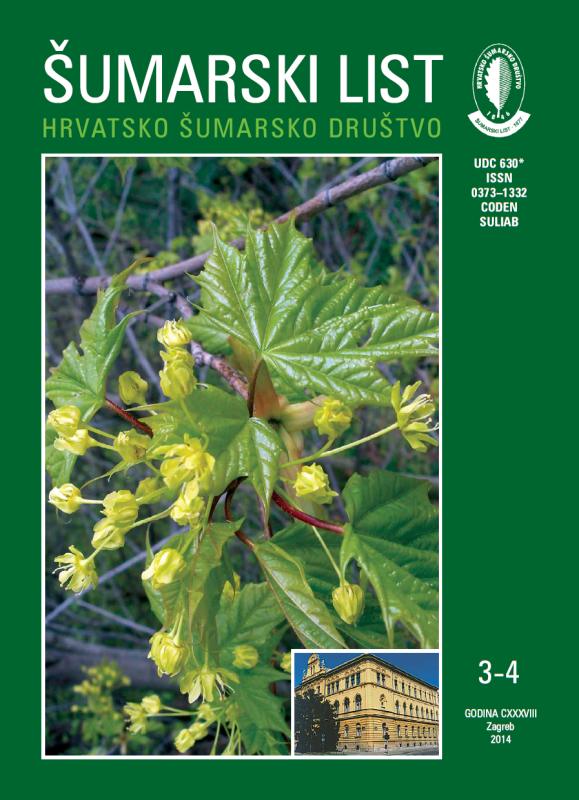
broj: 3-4/2014
pdf (8,09 MB) |
|
||||||||||||||
| RIJEČ UREDNIŠTVA | ||
| Uredništvo | ||
| THE STATUS AND POSSIBILITIES OF A MORE ACCURATE EVALUATION OF FORESTS AND FORESTRY AS PART OF THE ECONOMY OF THE REPUBLIC OF CROATIA pdf HR EN | 121 | |
| IZVORNI ZNANSTVENI ČLANCI | ||
| Jura ČAVLOVIĆ, Krunoslav TESLAK, Karlo BELJAN | UDK 630*569+653+231 (001) | |
| THE EFFECTS OF DIFFERENT STAND REGENERATION PLANNING ON MANAGEMENT AND PEDUNCULATE OAK FOREST DEVELOPMENT – A SMALL SIZE MANAGEMENT CLASS CASE STUDY pdf HR EN | 123 | |
| Dalibor Ballian, Alma Hajrudinović, Jozo Franjić, Faruk Bogunić | UDK 630*164 (Quercus trojana Webb.) (001) | |
| MORPHOLOGICAL VARIABILITY OF THE LEAVES OF THE MACEDONIAN OAK Quercus trojana WEBB.) IN BOSNIA AND HERZEGOVINA AND MONTENEGRO pdf HR EN | 135 | |
| Krunoslav Arač, Milan Pernek | UDK 630*453 (001) | |
| OCCURRENCE AND SPREADING OF THE LARGE LARCH BARK BEETLE (Ips cembrae) IN CROATIA AND POSSIBLITIES OF MONITORING BY USING PHEROMONE TRAPS pdf HR EN | 145 | |
| Maja Popović, Mladen Ivanković, Saša Bogdan | UDK 630* 165 + 181.8 (001) | |
| VARIABILITY OF HEIGHT GROWTH AND SURVIVAL OF PROGENIES FROM PEDUNCULATE OAK (Quercus robur L.) SEED STANDS AT THE FIELD TRIAL ‘JASTREBARSKI LUGOVI’ – FIRST RESULTS pdf HR EN | 155 | |
| Summary Previous studies of morphological and physiological trials of pedunculate oak in Croatia revealed genetic differentiation of local populations as well as high degrees of genetic diversity within each population. For further research of genetic diversity and differentiation of oak populations in Croatia, height and survival were analysed in a newly genetic test which contains progeny from 16 seed stands and one regular management forest stand (Table 1) at the age of four and five years, respectively (Figure 1 and 2). Survival for first analysed year was extremely good, but after the next vegetation period visibly decreased. Analysis of variance for mean height of two consecutive years (2010th and 2011th) revealed significant differences between populations (Table 2 and 3). Depending on the position within the genetic test same populations or families had different "dispersal" of mean height. We conducted a Tukey-Kramer test of the least square mean difference of population heights in order to determine their relationship, and to determine a possible geographic pattern of genetic differentiation (Table 5 and 6). Population HR 88 (FA Našice, Forestry Office Koška, Working unit Lacić-Gložđe) in both years differentiated as the highest of all, while other isolated groups of populations multiple overlapped. Comparing the significant difference in average height between populations and their geographic location geographic pattern of differentiation could not be observed (Table 5 and 6). An analysis of phenotypic plasticity of the studied populations for population height at age of 5 years was performed (Table 7) because of statistically significant effect of blocks. No geographic pattern of differentiation between populations was observed for the plasticity indices (PIv, RDPI) (Table 8). Populations were categorized into phenotypically stable, unstable, and with average phenotypic plasticity with varying degrees of adaptedness to the test site conditions that prevailed in the analysed years. For reforestation and afforestation of similar habitats as was at the field trial it is recommended to use forest reproductive material from seed stands whose progeny expressed average to high phenotypic stability with a high degree of adaptedness (in terms of survival and height growth). The results of this study should be considered as preliminary and stimulus for further research. Key words: pedunculate oak; genetic test; adaptive genetic differentiation and diversity; phenotypic plasticity. | ||
| Ivana Vitasović Kosić, Mihaela Britvec | UDK 630*187 + 268 (001) | |
| FLORISTIC AND VEGETATION CHARACTERISTIC OF FOREST EDGES AND GRASSLANDS OF ĆIĆARIJA (CROATIA) pdf HR EN | 167 | |
| PRETHODNO PRIOPĆENJE | ||
| Manana Kereselidze, Slavimira Draganova, Daniela Pilarska, Andreas Linde | UDK 630*453 | |
| SUSCEPTIBILITY OF Lymantria monacha AND L. dispar TO THE ENTOMOPATHOGENIC FUNGUS Isaria fumosorosea WIZE pdf HR EN | 185 | |


